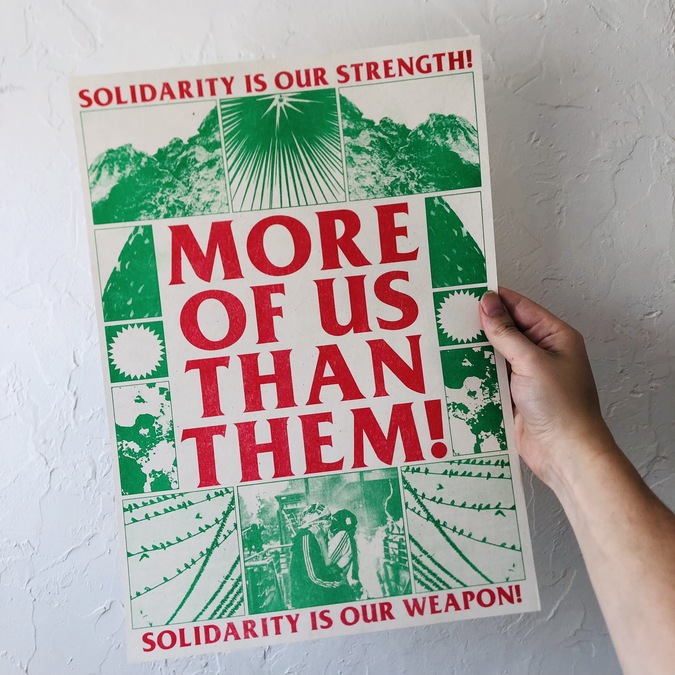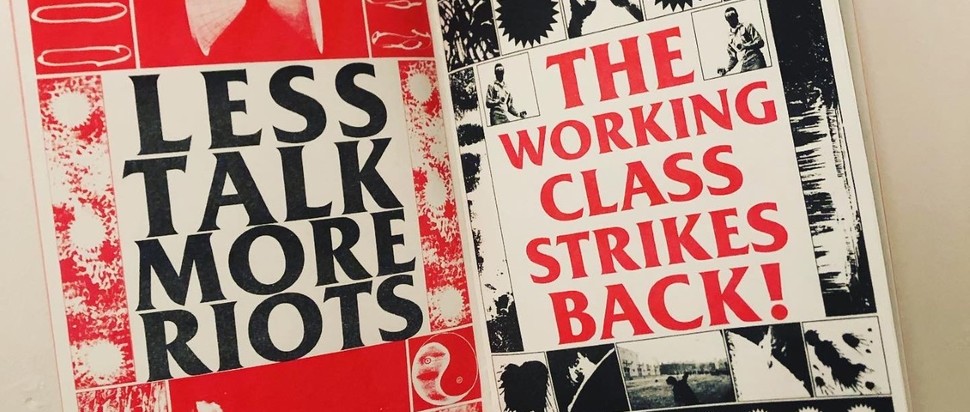Unpacking zine culture with Black Lodge Press
We chat with Cj Reay of Black Lodge Press about DIY culture, mutual aid, and the anarchist principles which underpin the Press
Anyone who’s spent time in queer and activist spaces will be familiar with the work of Black Lodge Press; if not by name, by its distinctive style – high-contrast colour schemes, provocative and bold slogans nestled amongst squares of duochrome printed illustrations. As part of this year's Glasgow Zine Fest, the founder and sole creator behind Black Lodge, Cj Reay, will sit alongside Anoushka Khandwala and Dr Jess Baines on a panel about radical self-publishing titled Political Vessels.
It’s impossible to miss the central message of any print sold by Black Lodge, with rabble-rousing calls to action or ideological statements emblazoned in bold capitals: 'SOLIDARITY FOREVER', 'LESS TALK MORE RIOTS', 'DEMOLISH ETON'. Whilst some designs use quotes and lyrics, Reay tells me that the original slogans are largely inspired by protest banners from his youth involvement with the anarchist scene – anti-border organising camps, direct action for climate justice, and rioting at G20 summits. The skill of conveying a punchy, provocative, sometimes funny yet always meaningful message in a limited number of words became a minor obsession for Reay’s friends, who would stage regular banner drops in and around Newcastle. “I think the protest banner is the best medium for it – fuck tweeting and all that crap,” he laughs. “A protest banner was the original tweet, I think.”
Growing up in rural West Cumbria, Reay was first introduced to DIY culture through the local punk scene as a teenager, before moving to Newcastle aged 19. There, he discovered zine culture through a DIY space called the Star & Shadow, a collectively-owned art space, cinema and bar, which also had free access to screenprinting equipment, photocopiers and a darkroom. Soon, Reay and a group of friends started self-publishing comics and zines under Newcastle Nerd Punks, producing listing guides for events happening in the city, and eventually Black Lodge Press emerged as a solo project, evolving from hand-drawn comics into prints and printmaking. It has remained a largely one-man operation for its 15 years, and Reay’s designs are riso-printed by Footprint, a worker co-operative based in Leeds.
Describing himself as an “accidental artist”, Reay has no formal training in art or digital design tools, or “anything you've got to pay for, basically”. Starting with the text or slogan for the piece, he selects images with both overt and subliminal connections to the message from a large bank of images he’s built over the years from scavenging old photographs, advertising and anything with expired copyright, combined with hand-drawn illustrations and textural elements made from scanned ink printing. This combination of physical artwork and unorthodox digital techniques is the signature of Black Lodge. “I love that cut-and-paste style,” he explains, “and being able to combine it with the computer to get the neatness – it’s a weird combination, but it works so well with riso.”
When asked what makes zines differ from more mainstream tools of cultural distribution (like journalism or academic theory), Reay emphasises that “there’s no rules in making a zine – no editorial, no censorship.” Combined with the power to quickly, easily and cheaply produce self-made publications, zines represent one of the few remaining forms of free expression. “Even if it's not political,” Reay says, “to disseminate an idea that you've had or to share your art outside of the structures of galleries, newspapers, publishers – I find it such a powerful thing, and it connects to so many other aspects of what I see as my politics.”
These politics are firmly rooted in anarchist organising, taking control of the aspects of living that are so often controlled by societal structures designed to atomise. Describing visiting large squatted communal housing in parts of Germany and Spain, Reay remembers being inspired by radical ephemera like graffiti, posters and stickers. These experiences became the catalyst for Black Lodge Press. “You can have all the politics you want,” Reay explains, “but if there's no culture, it's meaningless [...] you need to have art, you need to have graffiti, you need to have music that connects the dots between the radical messages.”

Despite its success and widespread recognition (over 50,000 followers on Instagram), the press has remained steadfast in these roots as a political project, an ethos echoed throughout their “business model” (a phrase at which Reay bursts out laughing). Many of his poster graphics can be downloaded and reprinted free of charge, and Reay often collaborates with groups on solidarity prints, in which he gives an organisation a free design for them to create prints and merchandise to raise money for their own causes.
In preparing for this interview, I was particularly interested in how Reay grapples with the aesthetic-based politics that has spread since the 2010s, which I have come to fondly refer to as “t-shirt radicalism”, but which actually reflects the hollow co-option of liberatory thinking into neoliberal pandering. As Black Lodge Press has grown as a 'brand' (if you can even call it that – he doesn’t) has Reay ever felt weird about how his work could potentially be implicated in that?
“Oh yeah, definitely”, he replies, recounting a story of a friend in Berlin who made similar political products who disbanded the project one day, publishing a zine titled Why I Stopped Making Merch For A Revolution That Does Not Happen. “I read that, and I was like, fuck,” Reay says. But creating and distributing art has never been about profit for Reay. “I would never charge for zines back when I started,” he says, “I would just leave them in places, I just wanted them to be out there.
“Any joker can put a slogan on a t-shirt and sell it,” Reay adds. “Buying a t-shirt is not a political act, wearing a t-shirt isn't necessarily a political act – it’s more about being part of a community and sharing and making visible radical ideas, even if it's just by putting a sticker on a lamp post.”
Throughout our talk we mostly avoided talking about party politics, but I had to bring it up; the UK faces its first 'leftwing' government in over a decade, yet people are becoming ever more disillusioned with party politics. At the same time, it feels harder and harder to imagine alternative ways of being outside of the current exhausting system. DIY spaces represent a place for the disenfranchised to build community, but they are hard to maintain – we reminisce about Edinburgh’s Forest Cafe, a volunteer-run co-operative which closed its physical space in 2022. The Glasgow Autonomous Space, a social centre which at one point had a library, wood and print workshop, and garden before it lost its space in early 2023, recently held its first open meeting about bringing the project back this year – a similar space in Edinburgh, the Autonomous Centre of Edinburgh, has been without long-term premises since 2022.
Over the coming years, how important will spaces like the Glasgow Zine Fest, Star & Shadow, and other DIY means of creating and sharing community and politics be in offering hope amidst an increasingly bleak political landscape? “I mean, I was radicalised by a Labour government, right?” Reay replies, sighing. “For me, it’s like choosing Pepsi or Coke: do you want to have your life fucked by someone with a red rosette or a blue one?
“Even a supposedly alternative culture can be taken over by people with money and sold back to you,” he adds, “but these places where you can create your own culture, and celebrate that culture – they’re partially for organising, but they’re also for existing in a way that you can be authentic with yourself and with your friends. I learned so much more in DIY, anarchist, or squatted spaces than I ever learned in mainstream education. There's no limit to what you can do there.”
Cj Reay of Black Lodge Press appears on Political Vessels at Glasgow Zine Fest, CCA, Glasgow, 3 May at 6pm
